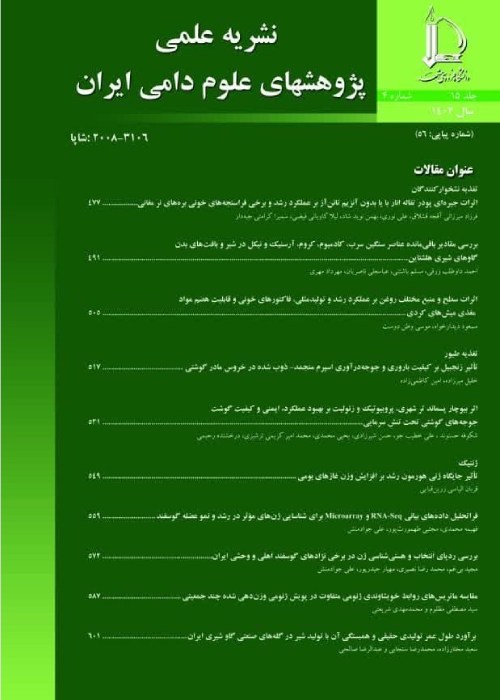Effect of different levels of vitamin C and L-carnitine on performance and some blood and immune parameters of broilers under heat stress
Author(s):
Abstract:
Introduction
High Environmental temperature during summer months which leading to heat stress, is of great concern in all types of poultry production. Feed consumption, growth rate, hatchability, mortality, and other important traits governing the prosperity of the industry are adversely affected by severe heat stress. Literature suggests that the advantages of dietary L-carnitine and ascorbic acid have been particularly apparent under heat stress (8).L- carnitine is a zwitterionic compound synthesized in vivo from lysine and methonine, and is essential for the transport of long chain fatty acid across the inner mitochondria membrane for β oxidation and remove toxic accumulations of fatty acids from mitochondria (18). Vitamin C is an effective antioxidant, which is essential for collagen synthesis, helps to maintain various enzymes in their required reduced form, and participates in the biosynthesis of carnitine, norepinephrine and certain neuroendocrine peptides (11). Invertebrates, insects, most fishes, some birds, guinea-pigs, bats and primates are not able to synthesize ascorbic acid. Thus, these animals must depend upon a dietary supply of this vitamin C. In poultry, ascorbic acid has been demonstrated to be essential for growth (25).
Materials And Methods
In this study, 396 of Ross 308 broiler chicks in a completely randomized design with 3 × 3 factorial arrangement with 4 replicates of 11 chicks in each replicate were used for 42 days. Treatments were 3 levels of vitamin C (0, 250 and 500 mg/ kg) and 3 levels of L-carnitine (0, 50 and 100 mg kg). In the first 3 weeks of breeding, broilers were under normal temperature and heat stress was done from the beginning of forth week. Feed and water were provided ad-libitum. Performance parameters were recorded weekly. The 0.5 mL suspension of 5% SRBC was injected at 28 and 35 days of age in one bird of each pen. To determine the antibody titer, blood was collected 1 week after each injection. Vaccination against Newcastle was done at 8 days of age and 10 days after that blood was collected for determining Newcastle titer. At the end of the experiment, one bird of each replicate was slaughtered and blood was collected for analyzing lipid parameters, and also carcass characteristics were analyzed.Results And Discussion
The highest body weight gain was observed in birds consuming 100 mg/kg of Lcarnitine and 500 mg/mg of vitamin C in the starter and total period of experiment (PConclusions
Based on the results of the current study, it is concluded that use of 500 mg/kg of vitamin C and 100 mg/kg of L-carnitine in combination can increase performance parameters and improve blood lipid and immune parameters of broilers under heat stress.Keywords:
vitamin C , L , carnitine , heat stress , broilers , blood parameters
Language:
Persian
Published:
Iranian Journal of Animal Science Reaserch, Volume:8 Issue: 1, 2016
Pages:
141 to 153
magiran.com/p1571910
دانلود و مطالعه متن این مقاله با یکی از روشهای زیر امکان پذیر است:
اشتراک شخصی
با عضویت و پرداخت آنلاین حق اشتراک یکساله به مبلغ 1,390,000ريال میتوانید 70 عنوان مطلب دانلود کنید!
اشتراک سازمانی
به کتابخانه دانشگاه یا محل کار خود پیشنهاد کنید تا اشتراک سازمانی این پایگاه را برای دسترسی نامحدود همه کاربران به متن مطالب تهیه نمایند!
توجه!
- حق عضویت دریافتی صرف حمایت از نشریات عضو و نگهداری، تکمیل و توسعه مگیران میشود.
- پرداخت حق اشتراک و دانلود مقالات اجازه بازنشر آن در سایر رسانههای چاپی و دیجیتال را به کاربر نمیدهد.
دسترسی سراسری کاربران دانشگاه پیام نور!
اعضای هیئت علمی و دانشجویان دانشگاه پیام نور در سراسر کشور، در صورت ثبت نام با ایمیل دانشگاهی، تا پایان فروردین ماه 1403 به مقالات سایت دسترسی خواهند داشت!
In order to view content subscription is required
Personal subscription
Subscribe magiran.com for 70 € euros via PayPal and download 70 articles during a year.
Organization subscription
Please contact us to subscribe your university or library for unlimited access!



